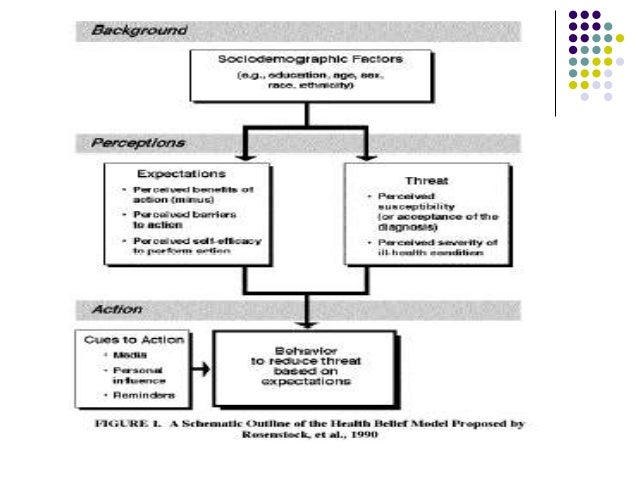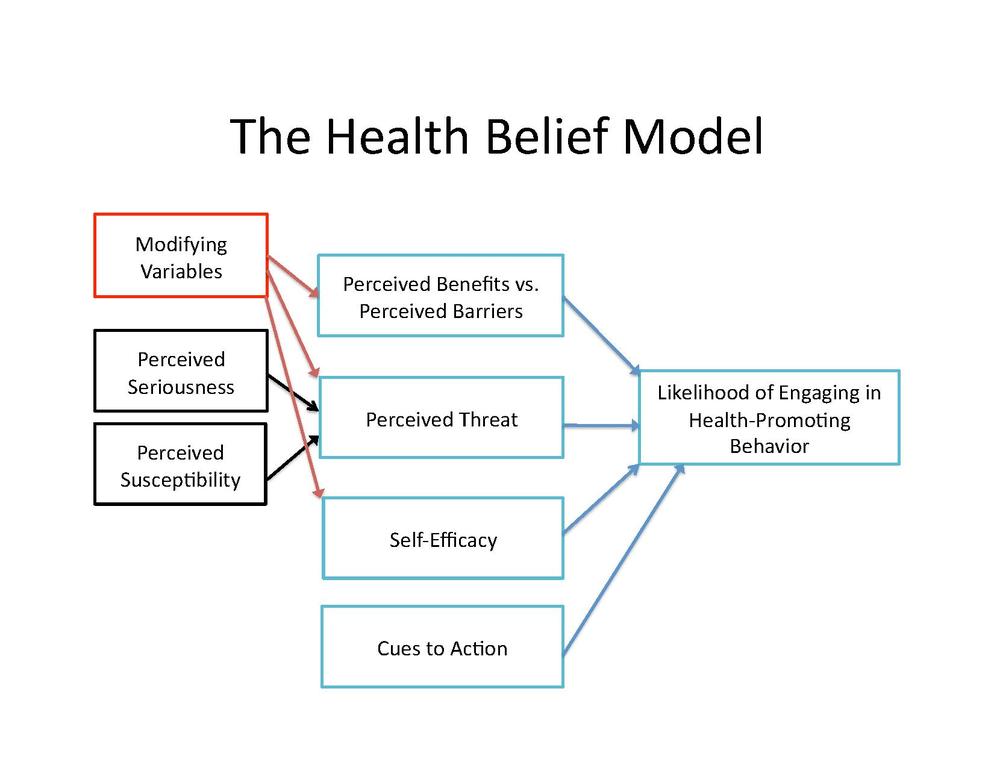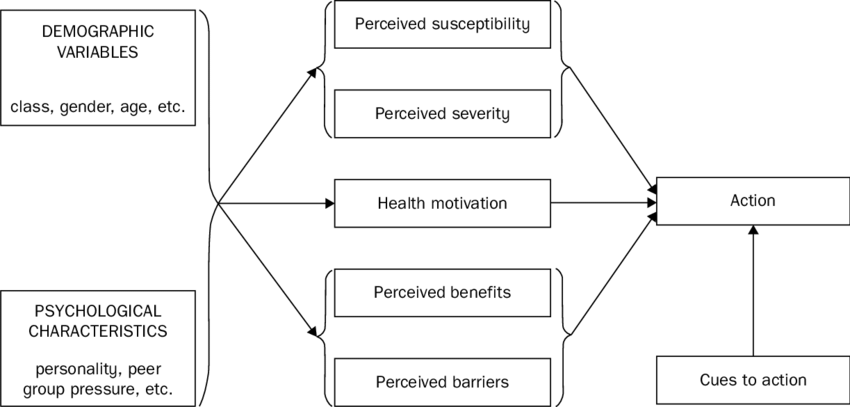44 health belief model diagram
The Health Belief Model As An Explanatory Framework In . The Ncbi.nlm.nih.gov Show details . 3 hours ago The Health Belief Model (HBM) posits that messages will achieve optimal behavior change if they successfully target perceived barriers, benefits, self-efficacy, and threat. While the model seems to be an ideal explanatory framework for communication research, theoretical limitations have ... Download scientific diagram | Flow Diagram of the expanded Health Belief model with the construct of "Commitment to Plan of Action" from "Health Promotion ...
The Health Belief Model (HBM) is a tool that scientists use to try and predict health behaviors. It was originally developed in the 1950s and updated in the 1980s. The model is based on the theory that a person's willingness to change their health behaviors is primarily due to their health perceptions. According to this model, your individual ...

Health belief model diagram
The Health Belief Model (HBM) is a psychological model that attempts to explain and predict health behaviors. It is a methodical tool that researchers or experts often use to determine or forecast human behaviors towards health. This is done by focusing on the attitudes and beliefs of individuals. Familiarizes theories from behavior disciplines ... The Irrational Health Belief Scale (Christensen, Moran, & Wiebe, 1999) was created in response to the assumptions of the Health Belief Model (HBM; Janz & Becker, 1984) that patients are rational when faced with decisions about their health. Health decisions, however, are often based on somewhat ambiguous information and may have to be made ... -- Created using Powtoon -- Free sign up at http://www.powtoon.com/youtube/ -- Create animated videos and animated presentations for free. PowToon is a free...
Health belief model diagram. The Health Belief Model (HBM) addresses the effects of beliefs on health and the decision process in making behavioral changes. Bowden, Greenwood, and Lutz (2005) identified it as one of the most studied theories in health education, used with varying populations, health conditions, and interventions. Health Belief Model. Becker's "Health Belief Model" will used to provide the theoretical underpinning for the study. The model is a framework for explaining people's behaviour aligned to health, physical and mental well-being (Polit & Beck, 2012). The model suggests that a person's health have to connect to behaviour based on two factors. The Health Belief Model (HBM) was developed in the 1950's by social psychologists Hochbaum, Rosenstock and others, who were working in the U.S. Public Health Service to explain the failure of people participating in programs to prevent and detect disease. Later, the model was extended by others to study people's behavioral responses to health ... THE HEALTH BELIEF MODEL In addition to a direct relationship between encoded expo-sure and H1N1 vaccination, it is plausible that indirect effects occurred through HBM variables targeted by the campaign. The HBM posits that people will take action to prevent illness if they regard themselves as suscepti-
The health belief model proposes that a person's health-related behavior depends on the person's perception of four critical areas: the severity of a potential illness, the person's susceptibility to that illness, the benefits of taking a preventive action, and the barriers to taking that action. The Health Belief Model is a theoretical model that can be used to guide health promotion and disease prevention programs. It is used to explain and predict individual changes in health behaviors. It is one of the most widely used models for understanding health behaviors. Key elements of the Health Belief Model focus on individual beliefs ... The health belief model stipulates that a person's health-related behavior depends on the person's per-ception of four critical areas: the severity of a poten-tial illness, the person's susceptibility to that illness, the benefits of taking a preventive action, and the barriers to taking that action (Hochbaum 1958; Rosenstock 1960, 1966 ... Health belief model. The Health Belief Model (HBM) is a widely used cognitive model of health behavior that was developed in the 1950s to explain the lack of participation in Public Health Service programs, responses to experienced symptoms, and medical compliance. At the most basic level, the HBM is a value-expectancy theory: behavior is ...
The Health Belief Model (HBM) was designed to predict health behaviour (11) and has been applied to behaviours such as drug taking, condom use, exercise participation or cessation of smoking (12). The health belief model usually explains preventive health behaviors, which are defined by Cassell and Kobe. Health behavior is a behavior that includes any activity a person believes should be done before the appearance of symptoms in order to prevent the disease, and it is the opposite of patient reaction ( 13 ). The Health Belief Model. Limitations of Health Belief Model. Page 3. The Theory of Planned Behavior. The Theory of Planned Behavior. Limitations of the Theory of Planned Behavior. Page 4. Diffusion of Innovation Theory. Diffusion of Innovation Theory. The Theory of Planned Behaviour (TPB), the Health Belief Model (HBM), and a modified HBM including intention were compared in their ability to predict ...
The health belief model (HBM) is a social psychological health behavior change model developed to explain and predict health-related behaviors, particularly in regard to the uptake of health services. The HBM was developed in the 1950s by social psychologists at the U.S. Public Health Service and remains one of the best known and most widely used theories in health behavior research.
The health belief model proposes that a person's health-related behavior depends on the person's perception of four critical areas: 1.the severity of a potential illness, 2.the person's susceptibility to that illness, 3.the benefits of taking a preventive action, and 4.the barriers to taking that action 7.
Terms in this set (20) Health Belief Model. -one of the first models that adapted theory from behavioral sciences to health problems. -developed to encourage behavior that prevent unwanted conditions. -decision to undertake preventive health action depends on value and expectancy. value. desire to avoid illness or get well currently. expectancy.
Health Belief Model. The Health Belief Model (HBM) is one of the most commonly used theories in the health behavior field. It is used as both an explanatory theory and a change theory. The HBM was first developed in the 1950s to evaluate why people were not using preventive services that were available locally.

Smith-Fangruida space tunnel and cosmic multidimensional distortion structure positive or negative, complex generalization
Download scientific diagram | Diagrammatic representation of the Health Belief Model Individual perception Modification factors Likelihood of action from ...
The Health Belief Model (HBM) was developed in the early 1950s by social scientists at the U.S. Public Health Service in order to understand the failure of people to adopt disease prevention strategies or screening tests for the early detection of disease. Later uses of HBM were for patients' responses to symptoms and compliance with medical ...
Download scientific diagram | A graphical representations of the Health Belief Model (HBM) [8]. from publication: The Validity of the Theory of Planned ...
Strategic Approach Based on Health Belief Model (HBM) and Theory of Planned Behavior (TPB) HBM/TPB Concept Relevant Research Findings* Concepts Being Tested Other Relevant Materials that COULD be considered for Testing Note: CDC Brochure and I Know PSA are listed in all rows Possible Approach ...
The health belief model diagram in this lesson is depicted in the context of a person. In the diagram, the person on the left doubts there is risk and is thus not likely to take action. Note the...
Download scientific diagram | 1 The health belief model from publication: The Health Belief Model | | ResearchGate, the professional network for scientists.
The Health Belief Model (HBM) posits that messages will achieve optimal behavior change if they successfully target perceived barriers, benefits, self-efficacy, and threat. While the model seems to be an ideal explanatory framework for communication research, theoretical limitations have limited its use in the field.
HEALTH BELIEF MODEL (HBM) • One of the most widely used and broadest of health behavior theories. • HBM has roots in behaviorist and cognitive psychology, with emphasis on the latter. HEALTH BELIEF MODEL (HBM) • HBM is what is known as a VALUE EXPECTANCY THEORY, where
HEALTH BELIEF MODEL 55. hospital interv ention combined with a f ollow-up telephone call; and (4) a follow-up telephone call. without the hospital intervention. Only 33% of the control group ...
it is in fact a behavioral model, which shows the relationship between health belief and behavior and is based on the prin- ciple that preventive behaviors depend on the individuals' beliefs...
Download scientific diagram | The Health Belief Model from publication: A Population-based Study into Knowledge, Attitudes and Beliefs (KAB) about HIV/AIDS ...
Health Belief Model The health belief model is one of the oldest models of health behavior, but is still very relevant when discussing health behavior change. This model addresses the readiness to act upon a health behavior based upon several individual beliefs. These beliefs include: 1. Perceived susceptibility — refers to beliefs
Download scientific diagram | Health Belief Model from publication: Designing a Game to Reduce Stress for Congestive Heart-Failure (CHF) Patients ...
The Health Belief Model (HBM) posits that messages will achieve optimal behavior change if they successfully target perceived barriers, benefits, self-efficacy, and threat. While the model seems to be an ideal explanatory framework for communication research, theoretical limitations have limited its use in the field.
-- Created using Powtoon -- Free sign up at http://www.powtoon.com/youtube/ -- Create animated videos and animated presentations for free. PowToon is a free...
The Irrational Health Belief Scale (Christensen, Moran, & Wiebe, 1999) was created in response to the assumptions of the Health Belief Model (HBM; Janz & Becker, 1984) that patients are rational when faced with decisions about their health. Health decisions, however, are often based on somewhat ambiguous information and may have to be made ...
The Health Belief Model (HBM) is a psychological model that attempts to explain and predict health behaviors. It is a methodical tool that researchers or experts often use to determine or forecast human behaviors towards health. This is done by focusing on the attitudes and beliefs of individuals. Familiarizes theories from behavior disciplines ...



































![Health belief model (HBM). Source: [25]. | Download ...](https://www.researchgate.net/profile/Praveen_Maghelal/publication/344874583/figure/fig2/AS:957002868076549@1605178672663/Health-belief-model-HBM-Source-25.png)




0 Response to "44 health belief model diagram"
Post a Comment